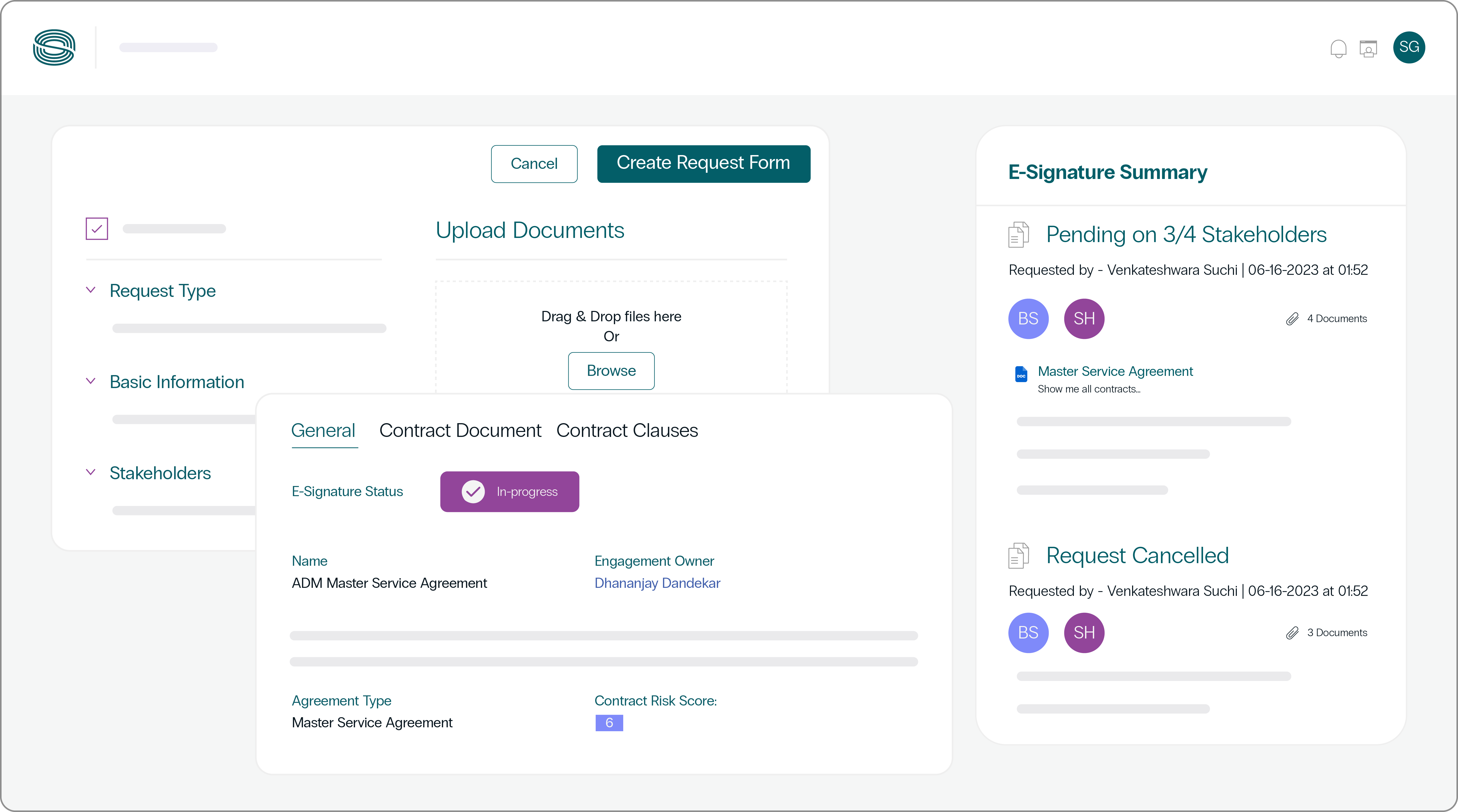What is Contract Authoring? Tools and Strategies for Creating Effective Agreements

- Last Updated: Dec 30, 2025
- 15 min read
- Sirion
Is your team drowning in slow, inconsistent contract drafting? The process of creating agreements, often seen as a necessary hurdle, can quickly become a major source of inefficiency, risk, and frustration. Searching for past examples, copy-pasting clauses, and lengthy review cycles drain valuable resources and delay critical business deals. It’s time for “Smarter Contract Authoring” – a strategic approach that streamlines creation, ensures consistency, and strengthens compliance, especially during the crucial ‘CREATE’ stage of the contract lifecycle.
For Legal Ops, In-house Counsel, Procurement, and Sales Ops leaders in large enterprises, mastering this stage is non-negotiable. In this blog, we will explore how combining foundational elements like contract templates and clause libraries with the power of Artificial Intelligence (AI) transforms authoring from a bottleneck into a strategic advantage.
First, let’s define contract authoring and why it matters.
Contract Authoring Defined
Contract authoring is the comprehensive process of creating and managing contracts between parties. It results in a legally binding document that clearly outlines the terms of business, protecting the interests of all involved. This process marks the initial phase of contract lifecycle management, where the agreement’s terms and conditions are established.
Why is Contract Authoring Important?
Contract authoring is foundational to how businesses engage with vendors and customers. Well-authored contracts set clear expectations and guidelines for both parties, laying the groundwork for successful partnerships. They serve as a critical reference point for ensuring that all parties adhere to agreed-upon terms, helping to mitigate disputes.
Additionally, the way contracts are drafted directly impacts your exposure to risk; clear contracts facilitate the tracking of deliverables, influence relationship dynamics, and ultimately affect ongoing collaborations. Conversely, poorly authored contracts can lead to misunderstandings that harm business performance and profitability.
Process of Contract Authoring
The process of authoring a contract involves several critical steps to ensure that all parties understand their rights and obligations. By following these steps, stakeholders can create a clear, enforceable agreement that meets their needs.
- Draft: Create the initial version of the contract, outlining terms and conditions.
- Review: Assess the draft for clarity, completeness, and legal compliance.
- Negotiate: Discuss terms with involved parties to address concerns and reach consensus.
- Approve: Finalize the contract after incorporating agreed-upon changes and obtaining necessary internal approvals.
- Sign: Have all parties sign the contract to formalize the agreement.
Why Does Traditional Contract Drafting Often Miss the Mark?
Manual or poorly managed contract drafting processes often struggle to keep pace with the demands of modern business. Relying on outdated methods introduces significant challenges that ripple across the organization, hindering speed and increasing exposure.
Here’s a closer look at the common contract drafting pitfalls:
- Crippling Inefficiency: Teams waste countless hours searching through old emails and shared drives for previous contracts, manually copying and pasting text, and routing documents for multiple rounds of review and approval. This administrative burden slows down the entire contracting cycle, delaying revenue and frustrating business users.
- Damaging Inconsistency: Without standardized language or templates, contracts drafted by different individuals or departments can vary wildly. This leads to “rogue clauses,” the use of outdated or non-compliant terms, brand misalignment, and confusion for counterparties, often extending negotiation times.
- Elevated Risk Exposure: Inconsistent or non-standard language isn’t just inefficient; it’s risky. It can inadvertently create compliance gaps with internal policies or external regulations, introduce unfavorable terms that disadvantage your organization, and increase the likelihood of future disputes. Identifying these risks manually is a tedious, error-prone task.
- Lack of Visibility and Control: When contracts are created ad-hoc across different systems or desktops, it becomes nearly impossible to track variations from standard terms, understand negotiated positions, or easily identify key obligations established during the authoring phase.
Building a Stronger Foundation: How Templates and Clauses Standardize Contract Drafting
So, how do you combat these issues? The journey towards smarter authoring begins with establishing control and consistency through standardization. This means creating and managing approved building blocks for your agreements: contract templates and clause libraries. These foundational elements provide the guardrails needed for faster, safer, and more reliable contract creation.
Taming the Template Beast: More Than Just Copy-Paste
Contract templates are pre-designed, standardized structures for recurring agreement types (like NDAs, MSAs, SOWs). They serve as the starting point for drafting, incorporating approved layouts, core terms, and placeholders for deal-specific information.
Leveraging templates effectively offers substantial advantages:
- Accelerated Drafting Speed: By providing a ready-made framework, templates dramatically reduce the time needed to create initial drafts, allowing teams to move faster.
- Guaranteed Consistency: Templates ensure that essential terms, formatting, and branding are consistently applied across all similar agreements, reinforcing your company’s standards.
- Empowered Self-Service: Well-designed templates enable business users (like Sales or Procurement) to generate standard contracts confidently with minimal legal intervention, freeing up legal teams for higher-value work. Juro, for instance, notes that standardization is key to enabling business teams to self-serve on routine contracts.
To maximize their value, follow these best practices:
- Develop templates for high-volume, routine contract types first.
- Establish clear ownership and approval workflows for template creation and updates.
- Store templates in a centralized, easily accessible repository – a core feature of effective CLM systems.
- Implement robust version control to ensure only the latest, approved templates are used.
Unlocking Consistency with a Robust Clause Library
While templates provide the overall structure, a clause library provides the standardized, pre-approved language building blocks within those templates. It’s a centralized repository of individual clauses (e.g., Limitation of Liability, Confidentiality, Governing Law) that have been vetted by legal and compliance teams.
A well-managed clause library is crucial for:
- Ensuring Compliance and Policy Adherence: Guarantees that only approved, up-to-date language reflecting current legal requirements and company policies is used in contracts.
- Mitigating Risk: Standardized clauses minimize ambiguity and ensure your organization’s preferred positions are consistently represented, reducing legal and commercial risk exposure.
- Speeding Up Negotiations: Using pre-approved standard and fallback clauses allows negotiators to quickly respond to counterparty requests with approved alternatives, reducing back-and-forth cycles. I
Building an effective clause library involves:
- Identifying frequently used and high-risk clauses across your contract portfolio.
- Developing standard language and pre-approved variations or fallback positions for negotiation flexibility.
- Implementing clear approval workflows for adding or modifying clauses.
- Tagging clauses with metadata (e.g., risk level, usage guidelines, approval status) for easy searching and management within a CLM system.
How AI and CLM Platforms Take Contract Authoring to the Next Level
Templates and clauses provide the structure. But to make contract authoring truly fast, compliant, and scalable, you need intelligence—this is where AI-powered CLM platforms step in. They don’t just automate manual steps; they actively guide, review, and optimize the entire contract authoring process.
Here’s how a modern AI-native CLM solution elevates contract authoring:
1. Smarter Drafting with Dynamic Templates and Clauses
AI analyzes deal parameters—like region, contract type, or deal size—to automatically assemble the right combination of templates and clauses. Instead of starting from scratch or choosing manually, teams get a tailored first draft instantly.
It also recommends relevant clauses in real time based on the contract’s context, flags non-standard or risky language, and suggests compliant alternatives aligned with your legal playbook.
2. Real-Time Playbook Enforcement
Using NLP and machine learning, AI-enforced playbooks monitor for deviations as you draft. Risk positions and fallback clauses are embedded into the workflow, reducing errors and ensuring alignment before the contract even leaves legal.
3. Automated Review and Redlining
AI significantly speeds up contract review by:
- Comparing language to preferred terms
- Highlighting deviations
- Suggesting redlines
- Explaining risks in plain language
This reduces back-and-forth, especially for non-legal users, and improves accuracy while shortening cycles.
4. Self-Service and Zero-Touch Contracting
Business users can generate contracts using guided questionnaires or automated forms. For routine contracts like NDAs, the system can create a full draft with no legal input, enabling true self-service and freeing up legal teams for strategic work.
5. Collaboration, Approvals, and E-Signatures
Modern platforms include built-in collaboration tools like tagging, comments, and auto-clause reconciliation, making it easy for stakeholders to co-author in real time.
Approval workflows can be automated based on contract complexity, and integration with e-signature tools ensures a seamless transition from draft to signed agreement.
6. Continuous Improvement Through Data
AI doesn’t just assist in the moment—it learns. Over time, it analyzes past contracts, negotiation outcomes, and clause performance to improve recommendations and drafting strategies continuously.
Key Outcomes of Effective Contract Authoring
Investing in a robust CLM process yields several significant benefits that can transform your organization’s approach to contract authoring and overall business performance. Here are the key outcomes:
- Consistency and Standardization
Ensures uniform terms, language, and formatting across all contracts, reducing ambiguity and maintaining brand and legal alignment. - Reduced Risk and Improved Compliance
Standard clauses, playbook enforcement, and automated checks lower legal exposure and help meet internal and regulatory requirements. - Faster Contract Cycles
Automation and AI-assisted drafting and review accelerate contract turnaround, speeding up deal closures and time-to-revenue. - Increased Efficiency
Self-service tools and automated workflows minimize manual effort, free up legal teams for strategic work, and reduce overall operational costs. - Better Collaboration
Integrated tools enable real-time input from legal, sales, procurement, and counterparties, improving accuracy and reducing back-and-forth. - Empowered Business Teams
Pre-approved templates and guided authoring let non-legal teams generate standard agreements with confidence and independence.
Implementing Your Smarter Contract Authoring Strategy
Transitioning to a smarter contract authoring model is a strategic initiative that requires planning and change management. While the specifics vary, the key steps generally involve:
- Assess Your Current State: Analyze your existing contract authoring processes, identify bottlenecks, and understand the types and volumes of contracts you handle.
- Define Your Standards: Determine which contract types to standardize first, develop your core templates, and begin building your clause library with clear approval workflows.
- Select and Implement Technology: Choose a CLM solution that supports your standardization goals and offers robust AI capabilities for authoring, review, and playbook enforcement. Consider platforms built with AI at their core, like an AI-Native CLM.
- Train Users and Manage Change: Provide thorough training to all users (legal and business) and communicate the benefits clearly to encourage adoption and overcome resistance to new processes.
Sirion: The Most Efficient AI Native Contract Authoring and Review Platform

Sirion offers an unparalleled contract authoring and review platform that enables legal, finance, sales, and procurement teams to collaborate effectively. With pre-approved clause and template libraries, it standardizes contracting across the enterprise, ensuring consistency and compliance. Users can create customized contracting playbooks tailored to their specific business needs, facilitating a streamlined process.
Sirion also automates ai-powered contract review and remediation processes, significantly improving efficiency and accuracy in contract management.
Transform Your Contracts from Bottlenecks into Business Accelerators
Stop letting inefficient contract drafting slow your business down. By strategically combining the foundational strength of standardized templates and clause libraries with the intelligent automation of AI, you can fundamentally transform your contract authoring process. This smarter approach not only accelerates deal cycles and reduces risk but also turns your contracts into valuable, data-rich assets that drive better business outcomes. It’s time to move beyond manual methods and embrace a future where contract creation is efficient, compliant, and strategically aligned with your organization’s goals.
Ready to see how AI-native contract authoring can revolutionize your process? Explore the Sirion platform or request a personalized demo today.

Sirion is the world’s leading AI-native CLM platform, pioneering the application of Agentic AI to help enterprises transform the way they store, create, and manage contracts. The platform’s extraction, conversational search, and AI-enhanced negotiation capabilities have revolutionized contracting across enterprise teams – from legal and procurement to sales and finance.
Frequently Asked Questions
Can AI in contract authoring adapt to changes in business or regulatory policies?
Yes. AI models can be trained on updated legal playbooks, regulatory requirements, or internal policy changes. Over time, the system learns from new data and user inputs, allowing it to stay aligned with evolving standards without requiring manual reprogramming for every update.
How does AI support contract authoring for non-legal teams?
AI enables guided self-service through dynamic templates, pre-approved clauses, and contextual suggestions. This allows business users—like sales or procurement—to confidently create compliant contracts without needing legal involvement for routine agreements.
How does AI handle industry-specific or niche contract language?
AI models can be fine-tuned using your company’s own contract data, including industry-specific terminology, risk tolerances, and preferred fallback positions. Over time, the system becomes more accurate and relevant to your specific context.
Is historical contract data really that useful in authoring new contracts?
Absolutely. By analyzing past outcomes—like how certain clauses affected negotiations, compliance issues, or disputes—AI can offer smarter suggestions for current contracts. It helps shift drafting from guesswork to data-driven strategy.
Will using AI in contract authoring require retraining the entire legal team?
Not necessarily. Most AI-native CLM platforms are built with intuitive interfaces and embedded guidance. Teams can start small—using AI for clause suggestions or reviews—then expand adoption as confidence grows. Minimal training is usually needed for basic use.
Additional Resources

AI Contract Review: Why Speed Isn’t Everything (And What Actually Matters)

